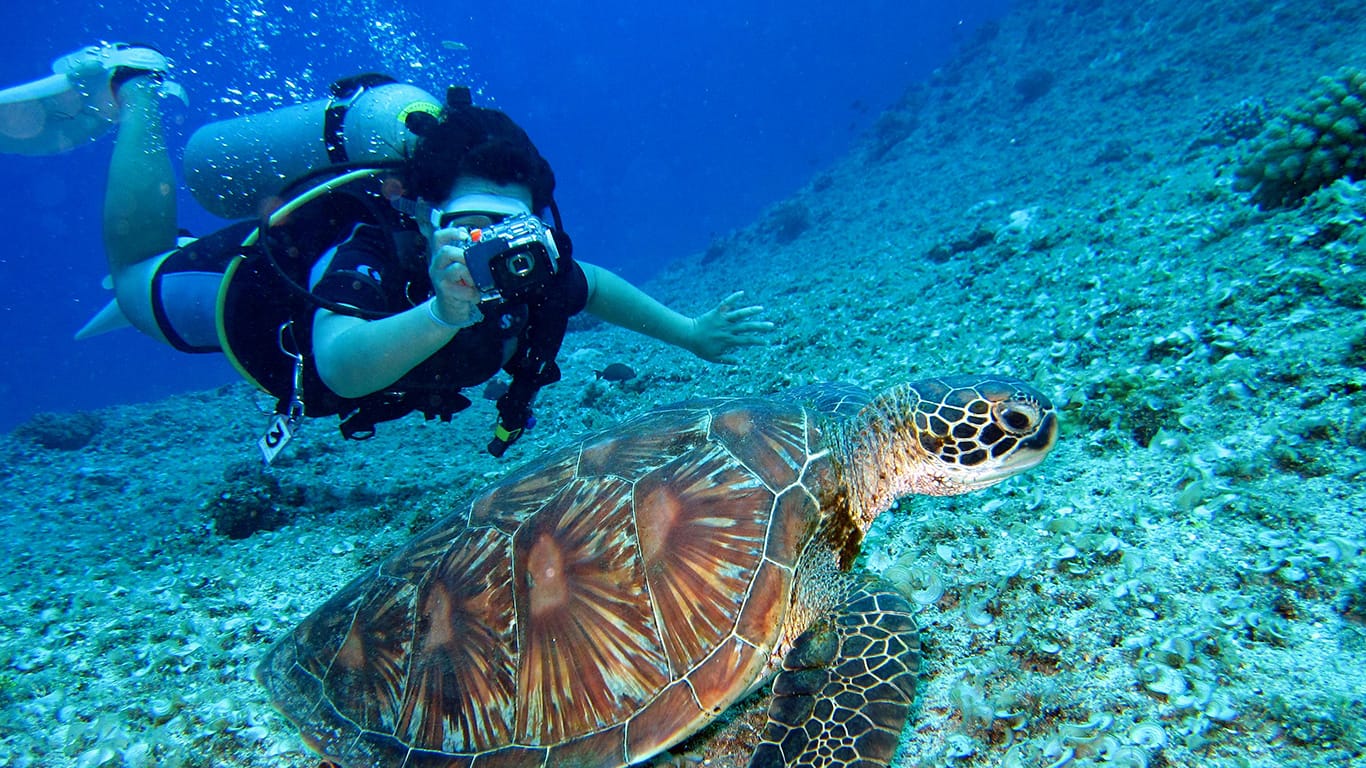Are you considering scuba diving but worried it might be too challenging? Don’t be! Learning to dive is easier than you think! While there are rules to learn and skills to practice, diving is genuinely inclusive. Scuba diving is a skill anyone can master with determination and an adventurous spirit. Many who once doubted their abilities had become certified divers, embracing a world of incredible underwater adventures.
Breaking Down the Barriers
The perceived complexity and challenges of scuba diving deter many potential divers. It’s common to hear concerns about physical fitness, technical know-how, and even fear of the unknown depths. However, these apprehensions often stem from misconceptions rather than reality.
Contrary to popular belief, scuba diving is more manageable than it seems. Anyone can become a certified diver with proper instruction, guidance, and a willingness to learn.
Understanding the principles of scuba diving
Scuba diving involves breathing underwater using a self-contained underwater breathing apparatus (SCUBA). It requires knowledge of safety procedures, equipment usage, buoyancy control, and dive planning. Learning these fundamentals is easy, especially with convenient e-learning options. You can access your scuba diving theory online, allowing you to learn to dive anytime and anywhere.
Overcoming the initial challenges
Adapting to a new environment and mastering technical aspects underwater can pose challenges. However, with the expert guidance of skilled instructors and a structured training program, these obstacles become opportunities for growth and development.
As individuals progress through their scuba diving training, they often find themselves overcoming these challenges and discovering newfound confidence and competence beneath the waves. Each lesson mastered, each skill honed, brings them one step closer to unlocking the full potential of their underwater adventures. Moreover, the camaraderie forged with fellow divers, and the sense of achievement derived from conquering new depths make the journey manageable, genuinely enjoyable, and immensely rewarding.
Consider your next holiday to a scuba diving destination.
There are several renowned scuba diving destinations around the globe, and one of them is Koh Tao in Thailand.
Koh Tao, also known as “Turtle Island,” is a small island in the Gulf of Thailand. Renowned for its stunning natural beauty, pristine beaches, and vibrant marine life, Koh Tao has earned a reputation as one of the world’s top scuba diving destinations.
The island boasts over 25 dive sites, ranging from shallow coral gardens to deeper underwater pinnacles and walls, offering diverse underwater experiences for divers of all levels. Koh Tao’s scuba diving is spectacular, from colourful coral reefs with abundant tropical fish to fascinating underwater rock formations.
What sets Koh Tao apart is its accessibility and suitability for beginner divers. The calm and clear waters surrounding the island and the abundance of dive centres offering comprehensive training courses make it an ideal destination for learning to scuba dive.
Apart from diving, the island offers plenty of opportunities for relaxation and adventure. Visitors can enjoy sunbathing on pristine white sandy beaches, exploring lush jungle trails, or indulging in vibrant nightlife at the island’s beach bars and restaurants.
Overall, Koh Tao’s stunning underwater world, laid-back island atmosphere, and range of activities make it a must-visit destination and the perfect place to begin your scuba diving adventure!
Choose A Good Dive Centre
When embarking on a diving journey or enrolling in a diving course, surrounding yourself with the right people and learning in the proper environment are essential. This is where choosing the right dive centre becomes crucial. But how do you go about selecting the perfect dive centre?
- Have an idea of what you expect of a dive centre. Do you want a small personal service or a luxury dive centre that organises dives with large groups of people?
- The human element is paramount at a dive centre. From your first inquiry to the end of your diving adventure, the staff’s attitude and expertise greatly influence your overall experience. Seek centres where staff members are welcoming, knowledgeable, and accommodating to your preferences and questions. A friendly and experienced team can make you feel like part of the diving family, ensuring a safe and enjoyable journey underwater. Testimonials and reviews are an excellent way to know what others think of the dive centre.
- A certified dive centre will give you peace of mind with qualified and trained staff, and the centre is up to date with its safety checks and maintenance, providing an all-around safe environment.
- Of course, a good dive centre can be recognized by its facilities and the state of its diving equipment. Please don’t be shy about asking them for their equipment service history. The same goes for the boats. It does not have to be a luxury vessel by any means, but maintenance and general upkeep of all gear relating to the business is essential.
- Diving is usually done on a holiday and in your well-earned free time. Checking the distance from the shop to the shore or dive sites will show you how much time you will spend in transit (and not diving). It is also worth checking out how many dive site options the dive centre can access in the area.
Let’s explore some common myths and unveil the truth about learning to scuba dive
Myth #1: You Need Exceptional Swimming Skills:
One of the most prevalent myths surrounding scuba diving is that you must be an Olympic-level swimmer to participate. Scuba diving courses typically incorporate swimming assessments to ensure you can comfortably cover a designated distance while maintaining a relaxed demeanour. The emphasis is not on speed or style but on fostering your confidence and comfort in the water. This inclusive approach allows individuals of varying swimming abilities to embark on their scuba diving journey easily.
Myth #2: Scuba Gear is Complicated and Heavy:
Another common belief is that scuba gear is too heavy and difficult to understand. Some people think it’s too complicated and challenging to use. However, modern scuba equipment is designed to be user-friendly and comfortable. With the proper training and practice, divers quickly get the hang of using their equipment. It may seem unclear initially, but with time, divers become comfortable and skilled with their gear, making their underwater adventures enjoyable and stress-free.
Myth #3: Diving Requires Advanced Technical Knowledge:
Many believe navigating the underwater world requires advanced technical knowledge, making it seem daunting for beginners. However, scuba diving courses are designed to cater to individuals who have yet to gain prior experience. These courses break down essential topics like equipment operation, safety procedures, and dive planning into easily understandable concepts. With guidance from certified instructors, even novice divers can quickly grasp the fundamentals of scuba diving and feel confident exploring beneath the waves.
Myth 4: “It Takes Too Much Time.”
Contrary to popular belief, scuba diving doesn’t require an overwhelming time commitment. Thanks to eLearning, you can now tackle the theoretical aspects of PADI dive courses from the comfort of your home and at your own pace. This flexibility eliminates the need for traditional classrooms, allowing you to explore the underwater world without the constraints of rigid schedules.
Wrap Up
Scuba diving is an accessible and empowering activity that unlocks breathtaking underwater experiences. While it may seem daunting initially, it’s easier than you think. Once you’re certified Open Water Diver, a whole world of stunning dive sites opens up to you, from exotic locations to local shores. With the proper training, support, and mindset, anyone can become a certified scuba diver and enjoy the world beneath the waves. Anyone can learn to dive confidently!




